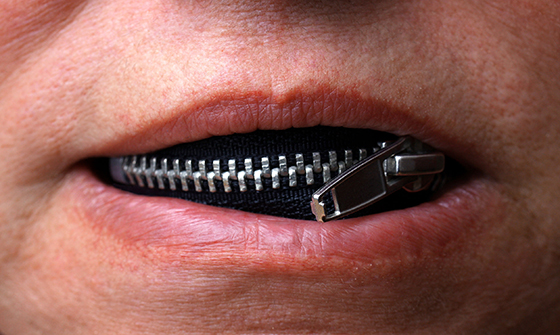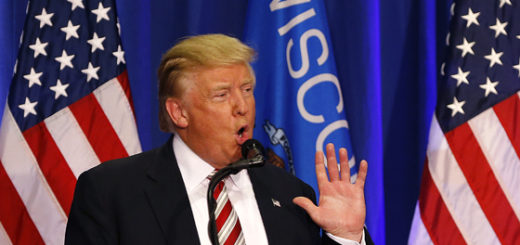Muzzled.
A recent dinner out with my wife and daughter and a study just released by the Cato Institute combine to inform this week’s commentary.
At dinner the other night, the subject of reopening schools came up. The president had earlier that day held an event at the White House at which he said, unequivocally, that schools need to fully reopen this fall.
“The president is 100 percent correct,” I said out loud. “Shhhhhh, Dad,” said my daughter, glancing nervously left and right. She’s a college student and hers was a conditioned response. If you want to lose friends on a college campus, let the word get out that you don’t hate Donald Trump. Any college kid today who indiscreetly outs himself or herself as a conservative – or, worse, a Trump supporter – will be set upon by the leftist jackals that dominate college campus social media.
That experience at dinner dovetails into a brand-new report from the Cato Institute. The report reveals that nearly two thirds of Americans self-censor – in other words avoid truthfully stating their political beliefs – for fear of reprisal by friends, associates and even employers. Fear of the loss of friendships, the loss of standing within one’s peer group, shaming on social media or the loss of a job is causing people to increasingly refrain from publicly revealing their politics. Conversations among reasonable people who disagree are becoming increasingly rare.
According to the Cato Institute study, conservatives are three times more likely to self-censor than liberals. But even a slim majority of centrist liberals self-censor. All of this to say that save for those who self-describe as very liberal, most Americans are keeping their politics close to their vests.
Given the ubiquity of Facebook, Instagram, Twitter, et.al., and the capacity that those platforms have to spread information within a social circle at the speed of light, this should come as no surprise.
Nor should anyone be surprised that conservatives are much more likely to be reticent than liberals. Simply examine what happens within your own orbit.
How you ever been in a social situation at which someone who doesn’t even know you just assumes that you hate Trump, too – and converses with you accordingly? I have. But would you go to a party and – aside from your desire to avoid being rude – dare to express your disdain for Joe Biden to someone you just met?
My daughter’s experience is pretty typical. College kids who espouse liberal orthodoxy have no fear at all of being shamed on social media by conservative students (and they do exist). Liberal students have no fear of ostracization. They do not fear reprisal from their professors.
The takeaway from these anecdotal stories – together with the Cato Institute study – is that powerful forces have evolved that have become very effective at keeping conservatives from speaking their minds.
Between now and November 3, an appreciation for these forces should inform your consumption of news media in general, and any poll showing a huge Joe Biden lead in particular.









Topflight column. (And yes, the President is 100% correct, our schools MUST reopen.)
The First Amendment in a tie with The Second Amendment are fundamentally now under siege by the democrat Biden liberal leftists.
November 3, 2020, is the most critical election in our lifetime, perhaps of all time.
This threat by the Biden liberal left is very real and only YOU as a law abiding American of goodwill stand in the way of STOPPING them from turning our beloved country into an unrecognizable socialist fascist marxist nation state where the individual does not matter. It’s only about the collective to them, individual FREEDOM and individual RIGHTS be damned. Surely, all who read this, understand that that would be terrible beyond words.
In short, our country would then be on an ideological heading of evil toward totalitarian subjugation not unlike Communist China, Nazi Germany, and Soviet Russia–all three of which have killed millions of innocent people with abandon.. LET THAT SOAK IN.
Biden is the candidate whose party –the democrats– are sympathetic to and identify with the anti-American “BLM / Antifa marxist fascist terrorist groups” who are causing havoc in our large cities and on our college campuses where conservative free speech is attacked and The United States of America as Founded [1776] is vilified. NOT RIGHT! Americans who love our beautiful country cannot let this stand.
Don’t let anything cause you to miss casting your vote FOR President Trump on November 3rd.
America needs all of “her” patriots to come to “her” aid in this time of trouble.
Richard, an excellent follow up from you regarding Paul’s column and the dangerous state of our nation. I agree, the coming election may well be the most important election yet. We all need to not only vote, but to get our friends out to vote and not be afraid to SPEAK UP in defense of “these truths we hold to be self-evident”. Democrat mob rule, if it comes to power, will take us over a cliff.
Thank you. I agree. So important to let others know in our own circle of family and friends how imperative it is to NOT let democrats get into power. Yes, we must RAISE OUR VOICES FOR TRUMP and all Republican candidates.
Amen brethren. Just to expand on Paul’s central point; we need to remember the main tactic of the Fascists……extreme intimidation! This bullying starts in the elementary phase of education and continues through college graduation; however, this is in the form of social ostracizing and hostage taking by professors with their control over grades/GPA. This unchallenged power grows into what we are witnessing in these Democrat controlled cities, and eventually will metastasize into the misery experienced by Europe in the early part of the 20th century. These anarchists have only one dedicated goal, and that is to overthrow our government by any means necessary. Fear of losing one’s livelihood, safety for self and family, and preservation of life savings are all very strong motivation to “fall in line” and not “speak out of turn”. In November we must remember the poem by Martin Niemoller, which I paraphrase: First they came after the Jews, but I said nothing because I was not a Jew. Then they came after the Communists, but again I was silent, because I was not a Communist. Then they came after the trade unionists, but again I said nothing, because I was not a trade unionist. Then they came after me, and there was no one left to speak for me. It is imperative that the silent majority flex our muscles, voices, and ballots before it is too late! I totally agree with Paul that these polls do not reflect the true sentiments of many of the respondents, but the stakes are too high to be complacent. These power-hungry scoundrels will use every underhanded scheme available, including voter fraud, to prevail!
So right, Ron, ” It is imperative that the silent majority flex our muscles, voices, and ballots before it is too late!” We need to do a lot more than simply vote. We all need to speak out with a true and honest voice, with no fear whatever of being called “racist,” etc., etc. and etc. Take pride in your stand and let it be known.
When I am forced to wear a mask-it states “Trump 2020”-if they don’t like it I don’t care .
Trump 2020! Ready to Vote!
Love him or hate him, give Louie Gohmert credit for calling the Dems out on the floor of Congress. He has the guts to say what many of us think. What bother’s me is the silence from John Cornyn and Ted Cruz. Where are these guys? They should be leading the charge against all this nonsense.
https://twitter.com/meidastouch/status/1288081774841561088?s=21
Nothing like a “Hate Trump” twitter feed. I don’t do twitter, facebook, or any of those social media black holes. Have better things to do with my time. BTW: Even though Texas is still open, we do realize the gravity of protecting those who are most affected by Wuhan Virus. 95% of us are wearing masks, giving larger personal space (I HATE THE TERM social distancing), mucho hand sanitizer and wipes, washing hands. AND, all those deaths being reported by the Chinese virus IS NOT all virus related.
I have never participated in “twitter, facebook, or any of those social media black holes”, either. It is now widely understood that they are just another set of Left-wing dominated corporations that actively censors and suppresses Conservative opinion anytime their political ideology is threatened by a truthful exposure of their lies and misrepresentations. Numerous examples regarding heavy bias against Conservative web sites by Google search engines have also come to light this very week.
Many Conservative commentators and former users of the “black hole” media have switched to the Parler Free Speech Network in order to get past these censors. Anyone who depends on facebook and yahoo, etc., for legitimate news are in the echo chamber of ABC, CBS, NBC, CNN, MSNBC, NY Times and Washington Post, etc., and will continue to feed on the BIG LIE that is the propaganda product of the newly minted Marxist Democrat Party, a Party that hates the founding Liberty principles of this country and those of us who want to protect those principles.
NO. President Trump was RIGHT all along.
https://www.breitbart.com/tech/2020/07/27/facebook-censors-viral-video-of-doctors-capitol-hill-coronavirus-press-conference/
Your first clue should’ve been “Breitbart.”
If you’re OK with “America’s Frontline Doctors and organized and sponsored by the Tea Party Patriots” stop washing your hands, and shake as many as you can.
OK Mr. Progressive; what do you people do in Rhode Island? Give us a clue to you everyday life in the “Original 13 Colonies”.
Michael, THANK YOU for asking.
Too few are curious.
https://www.politico.com/news/magazine/2020/07/08/gina-raimondo-interview-rhode-island-governor-covid-353799
American citizens 300+ million are NOT OK with being LIED to by the left mainstream media. They have an agenda and that agenda is against President Trump and against the U.S.A. as founded [1776].
Hydroxychloroquine + Azithromycin + Zinc Sulfate WORKS
The only reason some in the media say it doesn’t is because President Trump spoke about it positively. And they can’t stand that. And that’s the truth.
https://www.newsweek.com/gop-rep-louie-gohmert-says-hes-taking-hydroxychloroquine-treat-coronavirus-1521523?utm_medium=Social&utm_source=Facebook#Echobox=1596076359
https://youtu.be/0dUUkpVpS_k
If there was no CENSORSHIP of conservative voices* –*i.e. well known people like Dr. David Samadi to name just one– on Twitter, or Facebook, or Google/YouTube,… the China coronavirus aka COVID19 would be defeated and gone and our country back to normal MUCH, MUCH sooner than later. Again, those on the political left want to drag this out in hopes to damage the economy just enough to hurt Republicans especially President Trump going into the November election.
NEWSFLASH – ISN’T GOING TO HAPPEN! — NOTHING is going to stop the American voter (who is smart) on Nov. 3rd from going to the polls in droves to cast their vote FOR Trump and his fellow Republicans. Because the U.S.A. is too precious to be turned over to the Biden leftist democrats who would devastate our beloved nation turning it into a land unknown and unrecognizable.
WHICH Cornyn? The folksy guy y’all see in every-6-years TV commercials back-home? Or the Swamp dweller in the expensive suit in DC?
And Ted? Since he re-upped, he grew that laughable beard and settled-into Cruz Control til he needs your vote again in 4 more.
And don’t let croakin’ Luigi’s occasional sideshows fool you into thinking he hasn’t caught Potomac Fever too.
TERM LIMITS
BREAKING NEWS, and who could make THIS up?
Nobody muzzles Luigi…
https://www.rawstory.com/2020/07/louie-gohmert-tests-positive-for-19-after-refusing-to-wear-a-mask-at-barr-hearing/
Dude, you have ZERO standing in Texas. Rhode Island? Really?
I’ll defer to Paul on that.
ALTHOUGH my first post here — on topic “Muzzled” no less — was…muzzled…
You’re right.
He’s less a FOOL because of where I live.
If there is a better example of being “muzzled”, I don’t know what it might be after viewing the INQUISITION (so-called Congressional Hearing) of Attorney General Barr last Tuesday by the malicious Democrat character assassins that defamed, disrespected, and dishonored Mr. Barr while “reclaiming their time” to shut him up and preventing his response to their lies. I thought I was watching a WW2 movie as the “Nazis Prosecutor” (in a kangaroo court) was interrogating a German patriot destined to be sent to the gas chambers.
Let us not forget that the Democrat party has been absorbed by radical totalitarian Communists (followers of Alinsky, Marx, Stalin, Hitler, Mao, et al.) that are determined to destroy Western Civilization and the pinnacle of its evolution, i.e., the Constitutional Republic of the United States of America. It is the Judaeo-Christian heritage that spawned our founding in which the Supremacy (Sovereignty) of the Individual was to overcome the historical rule by Government as subjects of the State. The lovers of Tyrannical Government HATE this evolution of Western Civilization and are determined to eradicate it from the face of the Earth.
Their hatred of Trump and their subversive and traitorous activities in and out of Government, Education, and Media for the last 80 years (and particularly the Coup D’état of the last 4 years) has finally been exposed as they foment terrorism in one-party Democrat dominated Cities and States, pretending to be “peaceful demonstrations”, of course. How stupid do they think we are? It is clear they are drunk on power and are convinced that their FREE, multi-billion dollar propaganda machine, the Left dominated Media, has guaranteed them a victory in November.
We are seeing a preview of their eradication of Human Liberty in favor of the New Marxist Tyranny that will dominate the New Collectivist American culture that they will install as Luciferian Cultists. We who object will either “bow the knee” or else be forced to “bow the head” for banishment to gulag camps for re-education, or worse. The followers of Alinsky’s Lucifer are playing for keeps and will institute a resurgence of the Dark Ages, if necessary, to establish their Marxist Utopia. If you doubt me, I suggest you talk to the Law Enforcement victims of the mobsters in Portland, Seattle, LA, New York, Dallas and Chicago, etc.
As an example of the Marxist motivation in this country, the Black Lives Matter anarchists are a Marxist revolutionary movement aimed at transforming the United States into a communist dystopia. BLM states that it wants to abolish the nuclear family, police, prisons, Christianity, and capitalism. BLM leaders have threatened to “burn down the system” if their demands are not met. The newly minted Democrats have merged with BLM and their radical goals. There is strong evidence that the riots we have seen had been waiting for any excuse to kick off a well planned national activation of turmoil and destruction.
Finally we should remember that Liberty is a HUMAN value, not a COLLECTIVE value. Liberty is slaughtered when the BIG LIE (foundation of TYRANNY) is allowed to prevail. Isn’t this why our Republic has been under assault by the Left since we have had so many weak Republicans that are willing to compromise with pure Evil for the sake of false “harmony”? The despicable RHINO’s of the last 30 years come to mind! Look at how many of them are willing to support Biden as they hasten our demise and furthermore, excuse Communist China for their eradication of dissent in any form as they force loyalty to the Communist Idol at ANY price. We may have only 97 days left to keep our Republic intact! Is the American voter sufficiently aware of the consequences of their decision on November 3, 2020?
RIP Herman Cain, Tulsa rally casualty.
Shame on you Rhode Island Red! Shameful but not surprising, as this is a typical leftist ploy to mourn (use) even a death to bash our president. Even Herman’s closest friends and family do not know where he may have contracted the virus, as he had been traveling a lot by airplane to attend many other events, and not prone to wearing a mask. Yes, the final diagnosis was Covid-19, but this was also the finding in a recent motorcycle accident that mutilated the driver. I guess the crushed skull was only a contributing factor? Some folks have no shame!
Thank you Ron for keeping the TRUTH afloat in the midst of a sea of Leftist Lies that gets worse every day. The FAKE news followers have descended into FAKE mourning. Their shameful activity has no bounds. It is wise to remember that “LIFE, Liberty, and the Pursuit of Happiness” is NOT their creed. LIFE (or reputation) is always expendable when a political power struggle is at stake that is designed to bludgeon our beloved America and its original founding on Righteous principles of God given Unalienable Rights.
Yeah, right,
No problema @ Tulsa.
Try a little Latin: “post hoc ergo propter hoc”. In English: “after this, therefore, because of this”. How about another? “Man eats carrots, man later gets cancer; therefore, carrots cause cancer. Yeah, right, we do not know if Herman contracted Covid-19 @ Tulsa, but if it makes you feel better to think that he did……knock yourself out.
Paul, please pardon my belated comments on this very important subject.
I think everyone here should accept the fact that the Marxist Mastermind Manipulation of Micromanaged Mandates (MMMMM) is still in place that had descended on our society from the Obama Rulership. This is nothing more that the continued Federal and State takeover of traditional American ingenuity born out of Freedom to Choose and Discover that Obama and his Executive Orders successfully smothered. Trump is trying to dismantle it in spite of the Deep State entrenchment that continues to subvert his efforts.
It is frightening to recently learn that ivory tower bureaucrats and their Marxist partners in Media had the audacity to MUZZLE highly skilled, experienced, and responsible Medical professionals as they (freely???) tried to publicize their treatment success with HCQ and other therapeutics that are very low cost and with decades of historical safety. These Doctors were using these drugs in a legal, “off-label” fashion to treat the COVID-19 infected patients or were using these drugs as a preventative for their own staff. Many hundreds (thousands?) of lives were apparently saved given the statistics where these drugs were NOT used. What makes these arrogant MMMMM followers think they know better how to treat patients than the Doctor who has a private, trusting, healthcare relationship with his own patients? Is this not a preview of the Nazi-like takeover of the medical profession that awaits us if the newly minted Marxist Democrats take over the country by ANY MEANS NECESSARY in the next election (Hello! mail-in ballots)?
This is nothing more than a Marxist-born interference in our economy that runs from energy, to transportation, to education, to media, to trade, to law enforcement, to farming and ranching, to fishing, to hunting, to self-defense, to housing, to religion and freedom of assembly, to family and birth (if allowed), to job choice, and to healthcare that keeps us alive. There is NO limit to the extent of Marxist Rulership in our lives if America is lost to them! Please read their Democrat-BLM Manifesto!
The “one size fits all” COVID-19 set of mandates from the Washington Ivory Tower bureaucracy that has destroyed our very robust and record setting economy of the last few years of the Trump administration was NEVER justified. If you protect the elderly (65+) from exposure with therapeutics and focus special treatment for those with underlying health issues, then the rest of society could have operated normally and the horrible financial and OTHER health issues that arose would have never occurred! The recent publication of accurate, COVID only, mortality rates, given exposure over the age spread, bears this out. Of course, you have to avoid the incredible stupidity of Governor Cuomo of NY who forced nursing homes to take infected patients that resulted in thousands of additional deaths that the Marxist Media followers still refuse to condemn.
The LEFT protects is own, regardless of malfeasance. The protection of LIFE, LIBERTY, and PROPERTY is ALWAYS expendable if it promotes their EVIL lust for power. This is why I am scared for the future of our country now that I can see a sample of their Tyranny in practice every day! The sad part is that nearly half of the country is ignorant of this subversive take-over of our culture due to our own reluctance to ring the bell of warning for the last 30 years, that is, since President Ronald Reagan left office.
One of the Physicians that directly provided President Trump with his incredible success with HCQ, zinc, and azithromycin, is Dr. Zelenko of Monroe, NY. One can find more information about his protocol at the following links:
https://www.youtube.com/watch?v=YKkrSUVGzIw
https://news.yahoo.com/newly-published-outpatient-study-finds-182500807.html
https://thezelenkoprotocol.com/
Warning: Dr. Zelenko believes that the politicization of successful COVID-19 treatments is causing UNNECESSARY deaths due to bureaucratic interference with legal, private, medical practice.
Thanks Solomon, you are definitely over the target! When the private practice of medicine is being bastardized by the Democrats, bureaucrats, and their stenographers, people suffer and possibly die. These ghouls cannot afford to support any therapeutic that could ease the pain of this pandemic! Anything that could help get past this virus will hurt Democrats chances to unseat our president and other Republican candidates. Well stated and well sourced!